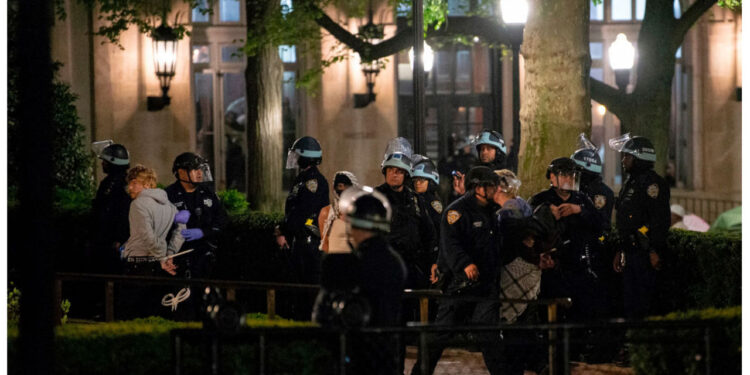The United States Department of Education is investigating Columbia University after receiving complaints of discrimination against Palestinian students and sympathizers.
Palestine Legal, a Palestinian rights advocacy group, filed a civil rights complaint with the DOE’s Office for Civil Rights (OCR) on behalf of four students, as well as the Columbia Students for Justice in Palestine student organization.
Columbia University has declined to comment on the ongoing probe. Columbia University is one of eight schools that the DOE has been investigating for possible Title VI violations related to shared heritage discrimination since April 22, as nationwide protests erupted. This is at least the second investigation into shared heritage prejudice since the outbreak of the Israel-Hamas conflict.
Shared ancestry cases are discrimination allegations based on ancestry, ethnic features, citizenship or residency in a country with a dominant religion or distinct religious identity, which may include Islamophobia, antisemitism, and other types of discrimination.
According to the DOE’s website, an inquiry by a school does not imply that the OCR has determined the merits of the complaint.
The complaint from Palestine Legal centers on the school’s request for NYPD officers to enter campus to help stop rallies, which resulted in the detention of over 100 students last week protesting Israel’s military actions in Gaza.
However, the complaint goes on to allege discrimination and harassment against Palestinian students, Arabs, Muslims, and students who advocate for Palestinians, including a January attack on demonstrators using a “chemical-based weapon.”
At the time of the incident, the New York Police Department told ABC News that demonstrators smelt a foul odor and began to feel nauseated with headaches during a rally on Friday. Numerous students hospitalized or required medical attention as a result of the incident, according to Students for Justice in Palestine.
Symptoms reported by victims included vomiting, nausea, chest and abdominal pain, and headaches.
Students have also reported receiving death threats, harassment for wearing keffiyehs or hijab, doxxing, stereotyping, and discriminatory treatment from high-ranking administrators.
Since April 17, student protesters opposing Israel’s war in Gaza have been camping out on the Columbia University campus, calling for the university to financially divest from companies and institutions that “profit from Israeli apartheid, genocide, and occupation in Palestine,” according to an online statement from the group Columbia University Apartheid Divest.
When University President Minouche Shafik attended a heated congressional hearing on antisemitism on Columbia’s campus, the campsite expanded.
The day after the hearing, Columbia requested that students leave their encampments. When students refused, Columbia University authorized the NYPD to disperse the demonstrators, and officers in riot gear detained over 100 protesters for trespassing.
New York City officials, including NYPD Commissioner Edward Caban, stated that the arrested protestors “were peaceful” and “had no resistance whatsoever.”
Following the protests, Shafik stated that the encampment “violates all of the new policies, severely disrupts campus life, and creates a harassing and intimidating environment for many of our students.”
Student demonstrators condemned the arrests, as well as the growing number of suspensions resulting from pro-Palestinian marches.
“We have knowingly put ourselves in danger because we can no longer be complicit in Columbia funneling our tuition dollars and grant money into companies that profit from death,” a statement from Columbia University Apartheid Divest read.
Tensions on college campuses around the country have been high since the start of the Israel-Hamas war on October 7, when Hamas militants attacked Israel. The Israeli military then launched its bombing of the Gaza Strip.
Since October 7, Israeli troops have killed at least 34,000 Palestinians and injured more than 77,000 others in the Gaza Strip, according to the Hamas-run Gaza Ministry of Health.
According to the Israeli Ministry of Foreign Affairs, Hamas and other Palestinian militants have killed at least 1,700 people in Israel and injured 8,700 more since October 7.
Since the first set of arrests, the encampment has grown, and pro-Palestinian protestors have commandeered a campus hall, resulting in additional arrests.
“Students and outside activists breaking Hamilton Hall doors, mistreating our public safety officers and maintenance staff, and damaging property are acts of destruction, not political speech,” he stated. “Many students have also felt uncomfortable and unwelcome because of the disruption and antisemitic comments made by some individuals, especially in the protests that have persistently mobilized outside our gates.”
Columbia University has continued to face criticism from all sides of the Israel-Gaza conflict, as well as legal action from a group of Jewish students who claim the university broke its safety regulations by allowing the encampment on campus.
Shafik has faced criticism for Columbia’s handling of antisemitism charges on campus.
“Safety is paramount, and we would do whatever is necessary to ensure the safety of our campus,” Shafik stated at the April 17 congressional hearing on antisemitism. “We must uphold freedom of speech because it’s essential to our academic mission, but we cannot and shouldn’t tolerate abuse of this privilege to harass and discriminate.”










